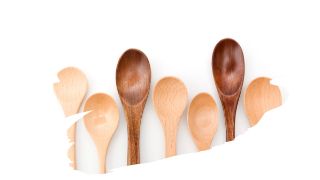Teak wood is resistant to decay, warping and cracking. And it’s tough too, tough enough to be used as a cutting board or butcher block.
But how does this tropical hardwood also fair as a wooden spoon kitchen utensil?
Well, in this post, you will learn why Teak wood is one of the most durable woods you can use in you kitchen. You will also learn why Teak wooden spoons are better for cooking with than metal spoons.
And keep reading to discover how you can best take care of those Teak wood cooking utensils.

This post may contain affiliate links to products that we receive a commission for (at no additional cost to you). Learn more here.
Is Teak Wood Really The Best Material For A Cooking Utensil?
This water-resistant hard-wearing timber is ideal for making cutting boards, wooden spoons, spatulas, and the like.
It’s water-resistance is due to the fact that Teak wood is a very oily hardwood. In fact, it is famously filled to the brim with it’s own wood preserving tree oils.
Teak tree oil, (which should not be confused with the wood finish called Teak oil), saturates the grain of this timber. And this saturation helps safe-guard Teak wood from decay and water-damage.
Related Post: Can You Apply Lemon Oil On A Teak Wood Surface?
But Is It Safe To Use Teak Wood As A Wooden Spoon?
Well, in sawdust form, Teak wood is a sensitizer. Which means that Teak wood sawdust can cause respiratory problems and skin reactions.
However, this isn’t unique to Teak wood. Why? Well, almost all wood sawdust can cause similar reactions.
Nonetheless, in its natural solid wood form, Teak wood is perfectly safe. And there are no known issues with having this hardwood come into direct contact with food.
But, Why Use Teak Wood? Why Not Just Use Metal For Your Cooking Utensils Instead?
It’s because of heat. Or, to be more specific, its because of the transfer of heat.
Metal is a fantastic heat conductor. And wood, is not. Which is why a number of recipes specify that you use a wooden spoon, (not a metal spoon).
What’s more, metal is an abrasive material, and it can scratch a pan more easily than wood. So, if you have a recipe that requires scraping — such as some pan sauces — then you’re better off using a wooden spoon.
Related Post: 5 Easy Halloween Wooden Spoons (Make ‘Em In Under 30 Minutes!)
And How Do You Take Care Of Teak Wood Cooking Utensils?
Well, Teak wood is a bit of a special case, in that it doesn’t need as much maintenance as other types of timber.
You see, cutting boards, wooden spoons, and spatulas, will go through a lot of soapy water washes in their lifetime. And, to protect these utensils from cracking, you need to regularly coat them with a food-grade non-drying oil.
For example, non-drying oils, such as pure Mineral Oil or Fractionated Coconut oil, can be applied onto wooden utensils.
Related Post: What Will Fractionated Coconut Oil Do To Your Cutting Board?
Now, typically, a wooden spoon will need an application of food grade mineral oil every one to two months.
However, Teak wood has a lot of it’s own natural oil already doing the job of that non-drying oil. So, Teak wood won’t need as frequent oiling as most other types of lumber. Which is why Teak wooden utensils only need oiling every 4-6 months.
However, keep an eye on the condition of that Teak wood, and be on the lookout for cracks or splits. If you do see any, then you’ll need to oil that Teak wood utensil more frequently.
What Is A Non Drying Oil? When it comes to wood crafts, there are two types of wood oil finishes; drying and non-drying. Drying oil finishes are exactly that; they will dry and cure into a hard coat. Non-drying oils, on the other hand, do not dry and cure. Instead, they remain ‘greasy’ to the touch, and never quite wash off.
And What Exactly Is Food Grade Mineral Oil? Is It Safe?
Well, pure food grade mineral oil is made from petroleum. And yes, that’s the same petroleum found in mineral spirits and diesel.
However, what separates food grade mineral oil from those other two, is the fact that it has been highly filtered. As a result, food grade mineral oil is not toxic if ingested. At worst, food grade mineral oil will give you the runs if you ingest too much of it. Which is why it’s sold as a laxative by pharmacies.
Nonetheless, this non-drying oil is not poisonous or harmful. And its perfectly safe if it happens to come into contact, (or a little of it gets into), your food.
To Wrap Up, Here Are The 3 Key Takeaways From This Post…
- 1). Solid Teak wood is safe for direct food contact.
- 2). Teak wood is naturally resistant to decay. So, Teak wood utensils will last-longer than most other types of wooden utensils.
- 3). Teak wood will still need maintaining, in the form of regular applications of pure food grade mineral oil.
References:
Bjorn M.Hausen PhD | Contact Allergy To Woods | Department of Dermatology, University Hospital, University of Hamburg, Hamburg, West Germany

![A Quick Beginners Guide To Rubber Wood Vs Teak Wood [For Furniture] rubber wood vs teak wood](https://www.thewoodworkplace.com/wp-content/uploads/2022/11/Banner-523-150x150.jpg)

